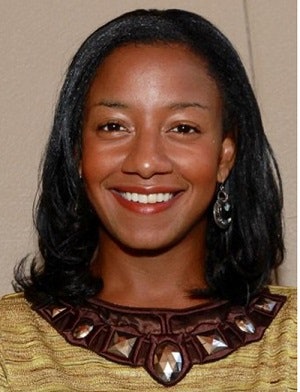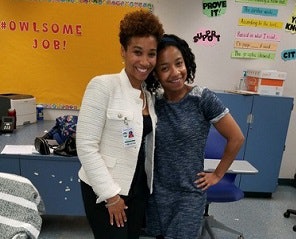Bentley Gibson had magical powers as a princess from another planet.
 Dr. Bentley Gibson
Dr. Bentley GibsonAt least, that’s how the 5-year-old Black girl presented herself to a sea of White classmates in White Plains, N.Y. on the first day of school. She sensed that they seemed to regard her as different, and make-believe was her mechanism for coping with the racial tension and subtle prejudice she would encounter not only during that school year but well into the future.
In college, she developed a passion for researching and studying implicit racial biases, the subconscious and unconscious prejudices and negative stereotypes that everyone has and that often lead to inaccurate assumptions about and discriminatory treatment of other people.
Today, Dr. Gibson is founder and chief executive officer of The Bias Adjuster consultancy, and a sought-after trainer on the topic of implicit racial bias who uses creative, research-based strategies to help educational institutions and other groups understand and address an issue that has become a national topic in discussions about race and equity.
“I’m in the trenches with this stuff,” said Gibson, an assistant professor of psychology at Georgia Highlands College. “You’re not going to get rid of implicit bias in everybody, but there is research out there that shows that eliminating it can be done. Attitudes and behaviors can be changed if people get the right strategies. A lot of strategies being used now are not research-based. That’s why it keeps happening over and over and over. We repeat the cycle over and over.”
Gibson said she has seen improvements in attitudes of participants immediately after her trainings. She conducts pre-testing and post-testing, and during sessions introduces participants – who typically are skeptical – to historical and modern information that often is new to them. She trains people of various ages and racial backgrounds who tend to – unknowingly – possess similar pro-white and anti-Black implicit biases.
Her passion and perspective are informed by a bachelor’s degree in psychology from Spelman College, a master’s and a doctoral degree in cognition and developmental psychology from Emory University, parents who experienced Jim Crow and a father who was the first Black student to graduate from his integrated high school and is extremely perceptive of racial bias.
 Dr. Gibson with Elicia Bennett after an implicit bias training in Florida.
Dr. Gibson with Elicia Bennett after an implicit bias training in Florida.Gibson, who has taught a course about the psychology of prejudice for three years, presents a 10-week, 20-session Bias Adjuster training for groups. Individuals can gauge their level of implicit bias using a tool on her Website. Based on a few questions about where someone grew up and his or her personality, Gibson can accurately predict exactly what sort of implicit biases the individual has about 70 percent of the time.
“That makes them open their eyes,” she said. “It makes people buy into it, and then we can change it.” She attempts that through introducing positive counter-stereotype information, scientifically proven tests and other activities.
Elicia Bennett, supervisor of the Department of Teacher Professional Learning and Growth for Broward County Public Schools, said Gibson’s approach is highly effective, partly because she avoids the finger-wagging, shame-on-you criticisms that fail to reach and engage participants, particularly White people. Gibson trained the Florida district’s 250 equity leaders so that they, in turn, can create programs to address implicit bias in 300 schools and education centers that serve 271,000 students in the nation’s sixth-largest school district.
“It has opened up the conversation and has been helpful in creating a dialogue that takes us beyond deficit thinking” about students of color based on implicit bias, Bennett said.
“She pretty much just opened up the room in a way I haven’t seen in a long time,” said Bennett, “Her ability to really help each person in the room become more introspective, and showing them examples of how bias plays out in ways that are realistic really confronts how the things we think we are doing right can be done better. She does a good job of not making it feel uncomfortable and an exceptional job of making people feel a sense of ownership for the work. You have to own the work and have that sense of urgency.”
Dr. Jillian Whatley, coordinator of psychological services for Atlanta Public Schools, met Gibson through a beautician who introduced them after hearing them talk about a shared interest – implicit bias – when they visited her salon. Whatley’s doctoral research explored how implicit bias and teacher expectations contribute to disproportionate numbers of children of color in special education, particularly Black boys, and she looks at interventions from the perspective of the implicit biases of people who implement policies.
Whatley, who won a research grant to study how implicit bias affects African-American male self-concept during transitional years, said she would like to collaborate with Gibson to further advance implicit bias training and other interventions. It can have a major impact on many educational issues that particularly affect Black and Hispanic boys, she said, from the school-to-prison pipeline and under-representation in programs for gifted and talented students to disproportionate suspension and dropout rates.
Whatley said she deliberately enrolled her 6-year-old daughter in a school that has an “anti-bias” curriculum because it’s important to teach children good citizenship and not just academics.
“I definitely see there is hope,” said Whatley. “With Dr. Gibson and myself being a voice for implicit bias and joining arms with organizations to help them do their trainings and then do the self-work, we’ve just got to keep planting seeds.”
LaMont Jones can be reached at [email protected]. You can follow him on Twitter @DrLaMontJones





















